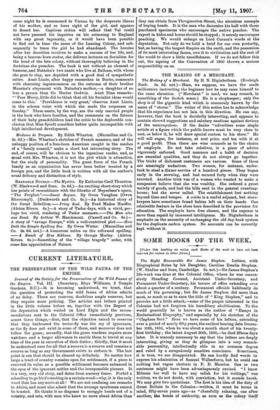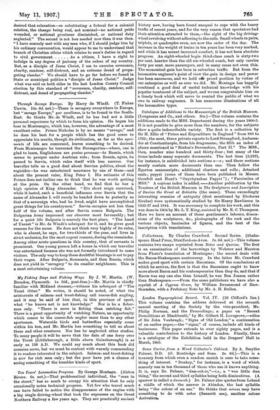SOME BOOKS OF. THE WEEK.
[Under this heading we notice such Books of the week as haat not been reserved for renew in other forms.] The Right Honourable Sir James Stephen. Letters, with Biographical Notes by his Daughter, Caroline Emelia Stephen. (W. Shafter and Sons, Cambridge. 6s. net.)—Sir James Stephen's life-work was done at the Colonial Office, where he was succes- sively Standing Counsel, Assistant Under-Secretary, and Permanent Under-Secretary, his tenure of office extending over about a quarter of a century. Permanent officials habitually do much of the governing ; but Sir James Stephen did more than most, so much so as to earn the title of " King Stephen," and to provoke not a little attack,—some of the people interested in the Colonies had not forgiven his hereditary abolitionism. To the world generally he is known as the author of "Essays in Ecclesiastical Biography," and especially by hiti sketches of the "Clapham Sect." Here we have some of his letters, extending over a period of nearly fifty years, the earliest bearing date Decem- ber 10th, 1810, when he was about a month short of his twenty- first birthday ; the latest August 30th, 1859,—he died fifteen days later. It is scarcely necessary to say that the letters are deeply interesting, giving as they do glimpses into a very remark- able personality, intellectually able in no common degree and ruled by a scrupulously sensitive conscience. Sometimes, it is true, we are disappointed. He can hardly find words to express his admiration of Samuel Wilberforce, but he could see nothing but vague rhetoric in F. D. Maurice. One or two sentences might have been advantageously excised. "I know Ifilman too well to have any relish for his writings," was written, we do not doubt, with conviction, but it sounds harsh. We may give two quotations. The first is his idea of the duty of Great Britain to the Colonies—written, it must be borne in mind, fifty-seven years ago—as "cheerfully relaxing, one after another, the bonds of authority, as soon as the colony itself
desired that relaxation—so substituting a federal for a colonial relation, the change being real, not nominal—no national pride wounded, or national greatness diminished, or national duty neglected." The second is not less needed now than it was then. "I have scarcely met with any man who, if I should judge him by his ordinary conversation, would appear to me to understand that branch of Christian ethics which relates to men's duties in regard to civil government As a citizen, I have a right to indulge in any degree of jealousy of the rulers of my country. But, as a disciple of Jesus Christ, I am to exercise reverence, charity, candour, self-distrust, and an extreme dread of propa- gating slander." We should have to go far before we found in State or municipal politics a "disciple of Jesus Christ." Judge what was said on both sides in the last London County Council election by this standard of "reverence, charity, candour, self- distrust, and dread of propagating slander."











































 Previous page
Previous page